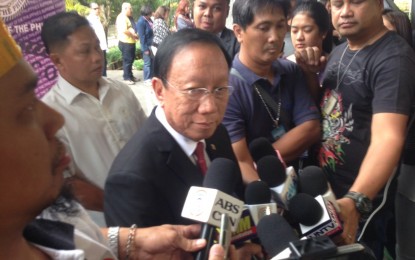
Solicitor General Jose Calida. (File photo)
MANILA -- Solicitor General Jose C. Calida bared detailed accusations against broadcast firm ABS-CBN Corp. of illegally acquiring smaller corporations which have legislative franchises over frequencies and using investment schemes to circumvent the constitutional restriction on foreign ownership of mass media entities.
"With the ploy being employed by ABS-CBN Corporation in acquiring several interests in corporations that hold legislative franchises in broadcasting as well as telecommunication services, the government is being hoodwinked as it is made to believe that the finite and limited spectrum had been allocated to those that are worthy to be accorded the privilege, when in truth it is only being utilized by one corporation, ABS-CBN," Calida said in his 63-page petition for quo warranto filed on Monday.
Calida also argued that the use of Philippine Depository Receipts (PDRs) by the broadcast network's holdings firm, ABS-CBN Holdings Corp. is not only prohibited by the Constitution but "criminal liability is also imposed on those who violate foreign equity restrictions and evade nationalization laws of the Philippines through various modes of proxy arrangement, making it appear as legal, but the entirety of the arrangement is to accomplish a transaction not allowed under Philippine laws".
Acquiring smaller firms which had their own legislative franchise, the SolGen said, violates standard terms in these firm's franchise grant which provides that the grantee shall not lease, transfer nor shall the controlling interest in the grantee be transferred, whether as a whole or in parts and whether simultaneously "to any such person, firm, company without the prior approval of the Congress of the Philippines."
Calida cited the instance where Multi-Media Telephony represented itself as ABS-CBN Convergence, where the latter was able to use the former's legislative franchise and secure a provisional authority for three years from April 12, 2014, before the National Telecommunications Commission (NTC).
"The use by ABS CBN Convergence of the name of Multi-Media Telephony is contrary to public policy, as it will only result in confusion and open the door to frauds and evasions and difficulties of administration and supervision," the petition said.
Multi-Media was incorporated on Sept. 20, 1993, and secured a legislative franchise to operate a wireless communication paging system. It was the fourth player in the then growing paging industry after Easycall, Pocketbell, and Beeper 150.
On July 23, 2015, it used the corporate name of ABS-CBN Convergence in its application of the extension of its provisional authority and request for the grant of additional frequencies before the NTC.
Calida also cried foul over the broadcasting firm's acquisition of Amcara which is presently ABS-CBN Sports and Action.
"The temerity of ABS-CBN Corporation to monopolize the frequencies or airwaves of the State can be readily seen from its investment in Amcara Broadcasting Network, Inc. (Amcara), another broadcasting company holding a legislative franchise under RA (Republic Act) 8135," Calida said.
Amcara was incorporated on April 11, 1994, and was granted a legislative franchise which lapsed into law on July 16, 1995, and will expire on July 16, 2020.
Amcara started its broadcasts using Channel 23. Channel 23 was, however, renamed Studio 23 in 2010 and was rebranded as ABS-CBN Sports and Action in 2014. ABS-CBN disclosed in 2012 that it had invested or advanced 49 percent of equity interest or ownership in Amcara, which ABS-CBN considers as one of its subsidiaries.
The top government counsel likewise said the firm circumvented the constitutional ban on foreign investments in mass media entities through the use of PDRs.
While the actual ownership of the underlying shares of ABS-CBN Corporation is maintained by ABS Holdings, the PDRs issued to non-Filpino citizens give foreigners a right to the cash flow of mass media corporations such as ABS-CBN Corporations which is a leverage to bargain for far greater control through the various enhancing mechanisms or proportionality-limiting measures available in the business world, the petition said.
"ABS Holdings even admits that the purpose of PDRs is to obtain foreign investment to increase their undervalued shares, and to allow foreigners to participate in mass media. As can be gleaned from the disclosure, ABS CBN Corporation has, for all intents and purposes, allowed foreigners to influence and participate in the mass media enterprise of the Philippines through the PDRs. This is exactly what the 1987 Constitution prohibits," the SolGen added.
ABS Holdings' issuance of PDRs to non-Filipino citizens is a scheme employed "making it appears that the shares remain with the Filipino corporation while granting influence over the mass media enterprise to foreign investors," it said. A foreign investor, in this case, may validly profit from a mass media corporation with a foreign equity restriction.
As of Oct. 16, 2019, as provided in the beneficial ownership disclosure of ABS CBN Holdings, Prudential Singapore Holdings Pte. Ltd., a Singaporean corporation, is a deemed substantial holder of 15,656,570 PDRs issued by ABS CBN Holdings. The PDRs were held in various funds managed by its subsidiary Eastspring Investment Singapore Ltd., a Singaporean corporation.
PDR holders earn dividends from their investment with ABS-CBN Corporation shares through the PDRs issued by ABS- CBN Holdings. Dividends declared as interest due to PDR holders amounted to PHP187.2 million in 2018, PHP334.2 million in 2017 and PHP239.9 million in 2016.
TPDR holders who are foreign investors may not only profit from a corporation that cannot have foreign equity such as ABS-CBN but indirectly own the corporation through their investments, Calida said.
On Tuesday, the Supreme Court (SC) has given the network 10 days to comment on Calida's quo warranto suit to cancel its franchise.
In an earlier statement, the ABS-CBN belied Calida's allegations, saying those were "without merit".
It said the PDRs were "evaluated and approved" by the Securities and Exchange Commission and the Philippine Stock Exchange prior to its public offering. (PNA)
